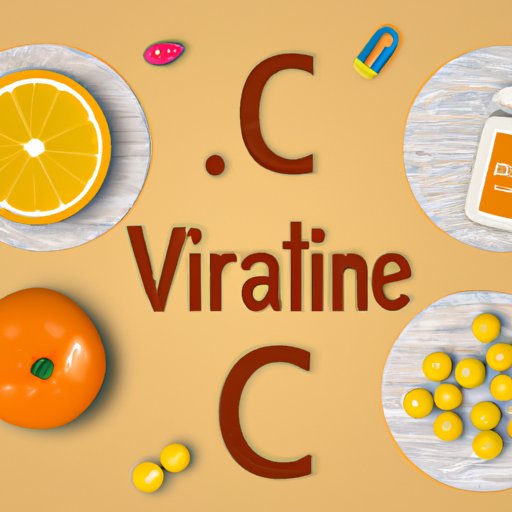How Much Vitamin C Should I Take a Day?
Vitamin C, also known as ascorbic acid, is a crucial nutrient for the human body. It acts as an antioxidant, helps to repair and regenerate tissues, and aids in the absorption of iron. The body does not produce Vitamin C on its own, which means that we need to obtain it from our food or supplements. In this article, we will explore how much Vitamin C an individual needs each day, which foods are rich in it, and the benefits and risks associated with consuming it.
Recommended Daily Dose of Vitamin C
The amount of Vitamin C an individual needs per day varies depending on their age, gender, and overall health. According to the National Institutes of Health, the recommended daily dose of Vitamin C is:
- Infants (0-12 months): 40-50 mg
- Toddlers (1-3 years): 15 mg
- Children (4-8 years): 25 mg
- Children (9-13 years): 45 mg
- Teens (14-18 years): 65-75 mg
- Adults (19 years and older): 75-90 mg for women; 90 mg for men
- Pregnant women: 85 mg
- Breastfeeding women: 120 mg
If you don’t consume enough Vitamin C, you may experience a range of symptoms such as fatigue, muscle weakness, joint and muscle aches, and scurvy. Furthermore, insufficient Vitamin C intake could lead to a weakened immune system, increased risk of infections, and slower wound healing.
Consuming more than the recommended daily dose of Vitamin C is not necessarily harmful, but excessive amounts (more than 2,000 mg per day) can lead to some side effects, such as gastrointestinal symptoms like nausea, diarrhea, and stomach cramps. In some cases, very high doses of Vitamin C could lead to the formation of kidney stones.
Foods Rich in Vitamin C
Natural whole foods are always the best source for nutrients, and Vitamin C is no exception. There are many fruits and vegetables that are naturally rich in Vitamin C. Some of the best sources include:
- Oranges, grapefruits, lemons, and other citrus fruits
- Kiwi fruit
- Strawberries and raspberries
- Mango
- Papaya
- Pineapple
- Grapefruit
- Red and green bell peppers
- Broccoli
- Tomatoes
- Spinach
- Kale
In addition to providing Vitamin C, these foods are also rich in fiber, essential minerals, and other important vitamins.
It’s important to note that the best way to ensure you’re getting enough Vitamin C is to get it from whole foods rather than supplements. In whole foods, Vitamin C works in synergy with other nutrients, and the body is better able to absorb it.
Benefits of Vitamin C
Vitamin C has numerous benefits for the body. Here are just a few:
- Improved immune function: Vitamin C stimulates the production of white blood cells, which fight infections and illnesses.
- Skin health: Vitamin C is essential for the production of collagen, a protein that helps keep the skin firm and elastic.
- Antioxidant support: Vitamin C acts as an antioxidant, which means it helps to protect the body from damage caused by free radicals.
- Reduced risk of chronic diseases: Studies have shown that higher Vitamin C intake is associated with a reduced risk of conditions such as heart disease, stroke, and certain types of cancer.
Risks of Taking Too Much Vitamin C
While it’s rare to consume too much Vitamin C through whole foods alone, high doses of Vitamin C supplements can lead to some potential risks. As mentioned earlier, consuming more than 2000 mg per day can cause gastrointestinal symptoms like nausea, diarrhea, and stomach cramps. In some cases, very high doses of Vitamin C could lead to kidney stones.
Who May Need More Vitamin C
While the recommended daily doses of Vitamin C are enough for most individuals, some groups may need to consume more due to certain factors. For example:
- Pregnant women: A higher intake of Vitamin C may be needed to support the growth and development of the fetus.
- Smokers: Smoking leads to the depletion of Vitamin C, so smokers may need to consume more than the recommended daily intake.
- People with chronic diseases: Conditions that cause inflammation or oxidative stress can increase the body’s need for antioxidants like Vitamin C.
Ways to Incorporate Vitamin C into Your Diet
Here are some suggestions for how to get more Vitamin C into your diet:
- Eat a variety of fruits and vegetables every day.
- Add slices of citrus fruit or berries to your water for a refreshing, Vitamin C-packed beverage.
- Include leafy greens like spinach or kale in your smoothies.
- Add bell peppers or tomatoes to your salads or sandwiches.
- Snack on fresh fruit or veggies throughout the day.
Remember, it’s always best to get your nutrients from natural whole foods whenever possible.
Vitamin C Supplements
If you’re not able to get enough Vitamin C from your diet, you may consider taking a Vitamin C supplement. Supplements can help to fill in the gaps in your diet, but they are not a replacement for whole foods. It’s important to speak with your healthcare provider before taking any supplements.
Conclusion
Vitamin C is an essential nutrient for the human body that plays a vital role in many functions. Aim to get the recommended daily dose of Vitamin C from whole foods to reap the most benefits. If you have questions about your Vitamin C intake, speak with your healthcare provider.
